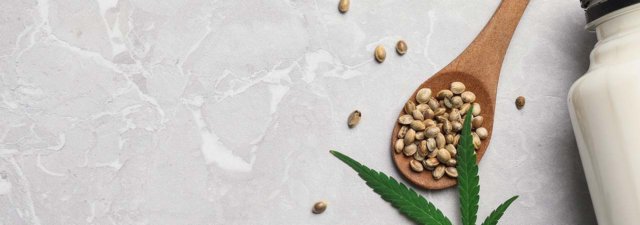Have you ever stopped to wonder what’s actually in that CBD oil you’re taking every day? I mean, hopefully the ingredients should be listed on the label, but let’s face it, do you really know what they all mean? Do you know what MCT oil is, for example? Or terpenoids? What about flavonoids or phytonutrients?
In this article, we break it all down for you part-by-part: everything you need to know with regard to the ingredients label on the back of your favorite CBD oil bottle, in one easy guide. (And hint hint: if there are more than two or three things on that label, you may want to start looking for a “new” favorite CBD oil…)
CBD Oil Ingredients: It’s All About the Oil, Baby!
Here’s the thing about cannabidiol (that’s the “scientific” name for CBD): it doesn’t work all that well as a pure isolate.
In fact, when 100% pure CBD is extracted from the cannabis plant and dried out, it actually looks a little bit like table salt – a bland, white/clearish crystalline solid that might easily be mistaken for another, far more sinister type of drug.
The reason why pure CBD doesn’t work so great as an isolate all by itself is because it needs to be infused into an oil so the human body can absorb and metabolize it efficiently. If you were to eat a spoonful of 100% pure CBD extract, you would absorb a little bit of it, sure, but the majority of the active compound would simply be passed through the renal system and excreted as waste.
When CBD is consumed as an infused oil, though, things are totally different; because the actual cannabidiol molecule is fat soluble rather than water soluble, it has a high affinity for the lipid content that’s found in essential oils like coconut oil and olive oil. Basically, this means that the crystalline solid will readily dissolve and attach itself to the molecular compounds in the oil, at which point they can be absorbed – and eventually utilized – by the body.
This is why (other than the actual CBD, of course), a high-quality essential carrier oil is the most crucial ingredient to any oral cannabidiol tincture. However, as you’ll soon learn, not all oils are created the same.
What Are the Best Oils to Use for CBD?
The majority of CBD products, in case you didn’t know, are sourced from raw hemp plant material. Hemp is classified under the same species of plant as marijuana (they both belong to the family Cannabis), but the major exception is that hemp is the non-flowering male version of the herb, while marijuana is the flowering, THC-producing female “version.”
In any regard, it’s worth pointing out that the hemp plant actually produces a super high-quality essential oil from its seeds, that, in addition to being filled with therapeutic CBD, is chock-full of other beneficial health supplements like phytonutrients, phytocannabinoids, terpenes, and flavonoids.
So you might be wondering, then, why do some manufacturers use coconut oil or olive oil as the CBD “carrier,” if the hemp plant itself produces a good oil?
Well, that’s actually a very good question, and is one that we’ve asked ourselves (and several CBD manufacturers) many times in the past. If you are going to be using a full-spectrum hemp extract, then why not just use the actual hemp seed oil itself as a carrier for the CBD?
Well, as it turns out coconut oil has some specific properties that many doctors and scientists believe aids in overall absorption and metabolism. This fractionated oil is called MCT oil.
Is MCT Oil in Hemp Oil Good for You?
There’s a lot of misunderstanding about MCT oil, so we’ll try and be as clear as possible here when describing why it’s used in CBD oil.
“MCT” itself is actually a natural extract from raw coconut oil, and it stands for medium chain triglycerides. Coconut oil has both “medium chain” and “long chain” triglycerides as part of its natural molecular componentry, but as we just mentioned there have been numerous studies that show MCT to be superior in terms of the efficiency of digestion. As such, a lot of health supplements (medicinal CBD tinctures included) have started infusing their products in MCT oils to try and market them as having “improved absorption,” or something of a similar sort.
What’s the catch?
But here’s the catch; separating the “MCT’s” from the “LCT’S” is not an easy process. In fact, it’s a very, very difficult process that involves highly technical instruments and a massive degree of chemical expertise. It’s assumed, in fact, that a decent majority of products labeled “MCT oil” are simply fractionated coconut oils. This doesn’t necessarily imply a good or a “bad” thing, it just simply just means that you may not be getting exactly what you think you’re getting when you see a label marked “MCT.”
In any regard, the primary reason all of use CBD oil anyway is for the healing effects of the cannabidiol compound — NOT for the enhanced digestive properties of the coconut oil extract. The bottom line, then, is whether your favorite CBD oil is infused in MCT oil, coconut oil, olive oil, hemp seed oil, or some other type of oil carrier, it probably doesn’t make a great deal of difference. The main thing is that you’re using a quality-grade product that’s been extracted using supercritical CO2 methods, and contains no added chemicals, thinning agents, heavy metals, pesticides, or fertilizers.
Why Does My CBD Oil Say ‘Hemp Extract’ on the CBD Ingredients?
Another thing you’ve likely noticed on your CBD oil ingredients label is something that says “Hemp Extract,” or “Cannabis Extract.” Essentially what this means is that the oil is a full-spectrum blend, and contains active hemp compounds in addition to the therapeutic CBD.
A full-spectrum “hemp extract” CBD oil will contain all the natural hemp compounds like aromatic terpenes (which are highly beneficial in their right), flavonoids, omega acids, phytonutrients, and other phytocannabinoids like CBG and CBC.
The reason manufacturers put “hemp extract” on the ingredients label rather than listing each and every individual component is because, in all honesty, they probably don’t know exactly how much of each specific compound is in that exact hemp strain. As long as they label it “hemp extract,” their bases are essentially covered and you as the consumer know that you’re getting more than just your isolated CBD component.
However, it’s worth noting that oils containing “hemp extract” are actually a really good thing; several high profile studies have shown that CBD works much more efficiently in the presence of the “whole” cannabis plant, rather than by itself as an isolate, so it is actually advised to look for a full-spectrum blend rather than something that’s labeled, for instance, “99.9% Pure CBD isolate.”
Final Thoughts on CBD Oil Ingredients
Well, hopefully this article has helped in some way to better understand that confusing ingredients label on the back of your CBD oil or CBD vape juice. Basically, you can expect the best CBD oils to be made with one of three or four things: coconut oil (this is probably the #1 preferred carrier oil), MCT oil (this is just a natural fractionated version of coconut oil), olive oil, or raw hemp seed oil.
If the product that you’re using has anything else in the ingredients other than these things (and possibly some natural flavoring if you’re using a flavored oil tincture), then it’s advised you shop around for something else, because it’s probably not a truly “pure” cannabis product.
If you have any questions at all about what’s in your CBD oil, or would like us to recommend some high-quality CBD tinctures, then feel free to give us a shout either in the comments or on our Facebook page. Also, remember that there are still few regulations in the CBD and hemp industries. While hemp is legal under federal law as a commercial crop, hemp-derived CBD products are (as of the time of writing) not evaluated by the FDA.

![What Is Melatonin in CBD Oil? [Exploring the Benefits]](https://wayofleaf.com/wp-content/uploads/2020/03/wol-banner-what-is-melatonin-in-cbd-oil-640x225.jpg)


![How to Maximize the Health Benefits of CBD [Answered]](https://wayofleaf.com/wp-content/uploads/2018/10/mj_how-to-maximize-the-effects_1920-640x225.jpg)



![How Many Grams Are in an Ounce of Marijuana? [Exact Answer]](https://wayofleaf.com/wp-content/uploads/2019/03/wol-banner-how-many-grams-in-an-ounce-640x225.jpg)

![How to Prevent Developing a Cannabis Tolerance [Must-Know Trick]](https://wayofleaf.com/wp-content/uploads/2018/01/wol_reduce-marijuana-tolerance_1920x450-640x225.jpg)

